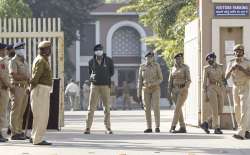A special court in Gujarat on Wednesday said it will begin hearing arguments on February 11 for deciding on the quantum of sentence for convicts in the case of 2008 Ahmedabad serial bomb blasts. The hearing was deferred on Wednesday after a defence lawyer requested some time to gather documents before the court begins further proceedings in the case.
On Tuesday, the court had convicted 49 persons in the case, which had claimed 56 lives and left more than 200 injured. In his verdict, which came 13 years after the deadly blasts, special judge AR Patel acquitted 28 accused, giving them the benefit of doubt.
The hearing on the quantum of punishment for the convicts will start from Wednesday, the court had said on Tuesday.
Those who were held guilty included Safdar Nagori, Javed Ahmed and Atikur Rehman. Among those acquitted were Mohammad Irfan, Nasir Ahmad and Shakeel Ahmed.
The 49 accused were convicted under various sections of the Indian Penal Code, Unlawful Activities (Prevention) Act (UAPA), Explosive Substances Act and the Damage to Public Property Act.
One accused was also convicted under the Arms Act.
The accused were convicted under IPC sections 302 (murder), 307 (attempt to murder), 121 (a) (conspiracy to wage war or attempt to wage war against the nation) and 124 (a) (sedition), and section 16(1)(a)(b) of the UAPA which concerns terrorist acts.
The convicts can attract a maximum punishment of death or imprisonment for life, and the prosecution will seek capital punishment for some of them, said special public prosecutor Amit Patel.
The prosecution argued before the court -- specially designated to conduct a trial in the case -- that the blasts were an act of terrorism, he said, adding that as many as 547 charge sheets were filed and 1,163 witnesses examined.
The convicts are currently lodged in six jails across India, including 32 in Sabarmati Central Jail in Ahmedabad. Others are lodged in jails at Taloja (near Mumbai), Bengaluru, Jaipur, Gaya and Bhopal, officials said.
All 77 accused who were on trial were presented before the court via video conference on Tuesday.
Of 28 acquitted, all but six have one or more other cases pending against them or are already serving sentences in past cases including under the Maharashtra Control of Organized Crime Act and cases investigated by the NIA. Hence, only six out of 28 acquitted persons will be released from jail.
Further, the trial of four other accused who were arrested later has not started and the prosecution has sought that they be tried jointly.
Among those awaiting trial is Yasin Bhatkal, a leader of the terror organization Indian Mujahideen (IM).
According to investigation agencies, the IM was involved in a string of bombings across the country including the 2008 Ahmedabad blasts.
Ahmedabad serial blasts: The Background
Twenty bombs went off in different areas of Ahmedabad city between 6:32 pm and 7:45 pm on July 26, 2008, killing 56 and injuring 246 others. As many as 29 live bombs were also found in Surat though none of them exploded.
The trial was conducted after the court merged all 35 FIRs.
The Gujarat government had transferred the investigation to the Ahmedabad crime branch. Present Gujarat director general of police Ashish Bhatia, who was then joint commissioner of police, had supervised the probe.
A total of nine judges presided over the trial at different times, starting with Bela Trivedi in whose court charges were framed on February 15, 2010.
Justice Trivedi is now a Supreme Court judge.
Special judge AR Patel who delivered the verdict had taken over the trial from June 14, 2017.
Police had claimed that members of the IM, a radicalized faction of the banned Students Islamic Movement of India (SIMI), were behind the blasts.
IM planned the blasts as revenge for the 2002 post-Godhra riots in Gujarat in which over a thousand persons, most of them from the Muslim community, had died, as per the investigators.
(With inputs from agencies)
Also Read | 2008 Ahmedabad serial blasts case: Gujarat special court convicts 49 accused, acquits 28 others
Latest India News

